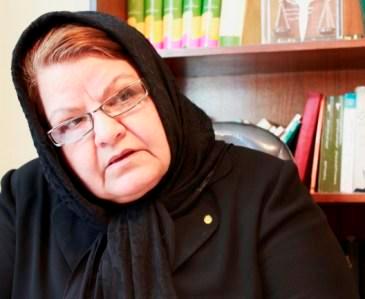Rouhani Delivered on Rights Charter Promise “Immediately,” but Issue Is with Implementation, Says Lawyer

“In fact the Citizenship Rights Charter is a repetition of the Constitution, and our issue has always been about the implementation of the Constitution. Maybe the same thing will now happen about the implementation of the Charter,” Farideh Gheirat told the Campaign.
In an interview with the International Campaign for Human Rights in Iran, lawyer Farideh Gheirat said that the draft Citizenship Rights Charter presented by Hassan Rouhani in November is almost exactly like the Iranian Constitution in substance, just with different phrasing. Gheirat added that there was no need to draft a new Charter that was as general as the Constitution itself.
“The draft Citizenship Rights Charter which has been put in the public domain for reaction is the same thing Mr. Rouhani had spoken about before the election, and fortunately, he delivered on his promise immediately. But, unfortunately, what we see in the Charter is the same as what is [already] in the Islamic Republic of Iran’s Constitution in almost all its articles, and perhaps only in one or two small areas, it may have added something to the Constitution. Of course, in Iran no new legislation can be in contradiction to the Constitution on principle, but taking the same [Constitution] and introducing it as a Charter or a separate thing is questionable and it appears to me that it was unnecessary,” Farideh Gheirat told the Campaign.
Asked about the way the Charter addresses individual freedom and the private domain, she said, “In this section there is content that was previously reflected in the Constitution and in the [Plan to Respect Legitimate Freedoms and Protect] Citizenship Rights that was passed a few years go. It just uses a different language and it discusses some issues more broadly.” Despite the redundancy, however, Gheirat believes that the proposed Charter does have a few good points. “For example, in the section under Women’s Rights, it repeats the entire Article 21 of the Constitution which has five paragraphs, but adds one area in which it is emphasized that gender segregation in higher education is meaningless and there must be no discrimination. This new section is really good and must be enforced.”
“So far I believe in Mr. Rouhani’s performance, therefore I have no real issues with this part of his work [the draft Charter], but my general expectation is that the Citizenship Rights Charter pay more and closer attention to the rights of children, women, and ethnic minorities, issues that are not addressed in the Constitution,” she added.
On May 10, 2004, the Iranian Parliament passed Mohammad Khatami’s proposed “Plan to Respect Legitimate Freedoms and Protect Citizenship Rights” after some adjustments and the Guardian Council approved it as well, but the law was never enforced. “What was proposed during Mr. Khatami’s presidency was, in my opinion, very good and advanced, and it mostly addressed issues within the Judiciary, like issues pertaining to charges and trials and things like this. But this Charter’s coverage is a lot broader than that and it encompasses some of the Constitution, some of the Khatami-era Citizenship Rights, and some of Ayatollah Khomeini’s ‘Eight-Article Directive,'” said Farideh Gheirat.






